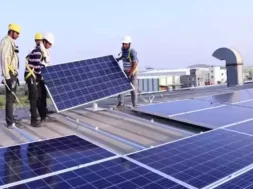
A high-level empowered committee on stressed power assets, formed under the chairmanship of Cabinet secretary in July 2018, had proposed a payment security mechanism through which REC and PFC (now merged) can make upfront payment to independent power producers.
State-run electricity distribution companies’ (discoms) dues to power producers stood at Rs 38,023 crore at the end of 2018-19, up 59.8% from a year earlier and 65% of these were “over-dues” with payment default of 60 days or more. The dues include those to independent power producers (about 46% of the total) and state-run utilities like NTPC, DVC and NHPC.
The steep rise in dues comes at a time when generation units with combined capacity of 40 gigawatts (GW) are stressed and the sector is still grappling with the fall-out of several years of muted demand growth.
To make matter worse, the private power producers are still waiting for payment of another Rs 6,865 crore from discoms as costs pass-through under the ‘change in law’ provision although these were approved by the regulators.
Also, about 15,000 MW of generation units are preparing to furnish additional bills for about Rs 17,000 crore to the discoms after the Central Electricity Regulatory Commission recently allowed them to claim compensation for the additional cost of coal procured through alternative sources due to Coal India’s failure to meet the supply obligations.
Receivables on this account have been accumulating since March 2017. According to data available with the power ministry’s ‘praapti’ portal, private power producers to which discoms owe the most are Adani Power (Rs 3,449 crore), Bajaj Power Ventures (Rs 2,330 crore), GMR Energy (Rs 1,888 crore), Sembcorp Energy (Rs 1,319 crore) and Tata Power (Rs 959 crore). Discoms’ failure to clear the dues to the producers coincides with these cash-strapped entities reporting financial losses of Rs 21,658 crore at the end of FY19, up 4.4% year-on-year, reversing the declining trend since the UDAY scheme for these entities’ revival was launched in November 2015.
Apart from the conventional power producers, the renewable energy developers have also started facing problems of delayed payments by discoms. Tamil Nadu, Telangana and Andhra Pradesh, the states which house more than 35% of the solar and wind power plants of the country, are increasingly becoming more undisciplined in their payment cycles to renewable power producers. Icra wrote: “The overdue receivable position for the renewable IPPs (wind & solar) in states such as Telangana and Andhra Pradesh have worsened to about 8 to 11 months, while that from utility in state of Tamil Nadu has been even higher with overdue receivable position exceeding 15 months for few entities rated in Icra’s portfolio.”
A high-level empowered committee on stressed power assets, formed under the chairmanship of Cabinet secretary in July 2018, had proposed a payment security mechanism through which REC and PFC (now merged) can make upfront payment to independent power producers. However, the group of ministers comprising RK Singh, Nitin Gadkari, Suresh Prabhu, Piyush Goyal and Dharmendra Pradhan constituted to examine these recommendations hasn’t approved the payment security mechanism.














